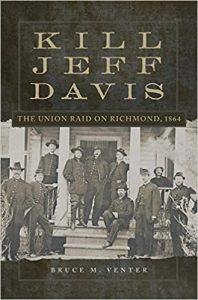Book Review: Kill Jeff Davis: The Union Raid on Richmond, 1864
 Kill Jeff Davis: The Union Raid on Richmond, 1864
Kill Jeff Davis: The Union Raid on Richmond, 1864
By Bruce M. Venter
University of Oklahoma Press, 2016 $23.99 hardcover
Reviewed by Doug Crenshaw
Judson Kilpatrick’s 1864 raid on Richmond is often overlooked by those who study the war in the East. Through his deep research and lively prose, Bruce Venter has gone a long way to remedy this.
Venter builds the action slowly, providing in-depth background views of Kilpatrick and his wing commander, Col. Ulric Dahlgren. He also discusses George Armstrong Custer’s diversionary raid towards Charlottesville, Ben Butler’s failure to cooperate, and a look at the tragic fate of Dahlgren’s guide. The author goes into depth about the stated goals of the mission, as well as more insidious ones.
Fortunately for Richmonders, and for the Confederacy, the raid failed. Venter employs first -hand accounts and vivid descriptions of the action to describe the crushed hopes of the Federals. It would not be the last raid on Richmond that year, but it was full of promise. The writing is engaging and the story is fascinating; it’s well worth the read.
Was the 1864 raid more than an attempt to free Federal prisoners and cause havoc in Richmond? Did it have a more sinister design: the capture and murder of Jeff Davis and members of his cabinet? If so, who was really behind the plot? You’ll have to read Bruce Venter’s book to form your own opinion…

President Lincoln and SecWar Stanton met Ulric Dahlgren in May 1862, when Lincoln and Stanton were operating as “Joint Commanders of the Armies of the United States” (following removal of McClellan from the supreme role as General-in-Chief in March 1862.) Dahlgren, whose work alternated between Navy and Army operations, was soon assigned roles “assisting” on staff of various Union Generals; and he was invited to participate in the raid on Richmond at almost the same moment that Ulysses S. Grant, gaining promotion to Lieutenant General, was being called east to become General-in-Chief.
Just another coincident of the U.S. Civil War… which has potential to make this book a fascinating read…
Lincoln doesn’t strike me as an assassination supporter. Stanton was intelligent enough to not support such a scheme since it would mean Lincoln and himself could be targeted, but others working in the executive branch of government? Not sure.
Part of the mystery for over 150 years: “Were the orders found on Colonel Dahlgren’s body outside Richmond genuine?” Or a forgery, to make it appear the Lincoln Administration was engaged in “black flag” warfare…
Fascinating. We’ll probably never know for certain. I say the above about Lincoln and Stanton, but they were just men trying to win a war to hold on to political power.
Jeff Davis’ reaction to seeing those documents strikes me as genuine surprise. So I’ve never thought he was behind it for propaganda reasons.
And for anyone curious about “the information published by the CSA Government regarding the Dahlgren Raid” as claimed recovered from the body of Colonel Ulric Dahlgren, the Richmond Daily Dispatch of 5 MAR 1864 page one cols.3 & 4: https://chroniclingamerica.loc.gov/lccn/sn84024738/1864-03-05/ed-1/seq-1/